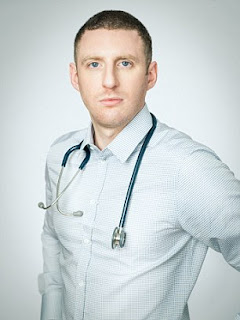'Now, the CPS is considering prosecuting doctors who undertake cosmetic vaginal surgery.
While I do not like this type of surgery, if adult women wish to have the shape of their genitals altered (doing so for personal reasons), that is entirely their choice.
The idea of criminal prosecutions over adult cosmetic surgery is particularly absurd when baby boys can legally undergo religious circumcision — a painful operation that can have life-long consequences — without anaesthetic, carried out by someone who isn’t medically qualified.
Dr Max Pemberton: One of the founding principles of the NHS is that it is free at the point of access, and for good reason: it ensures people receive help on the basis of need, rather than their ability to pay.
But there is a downside. The system is open to abuse by those who are not entitled to use the NHS.
This week the Mail reported proposals to extend passport checks across the NHS after successful trials in areas of high immigration, where people were asked to prove their identity to confirm their eligibility for free treatment.
Predictably, this plan was met with howls from the Left that it was racist and offensive. The British Medical Association chairman Dr Mark Porter, speaking on Radio 4, was among the critics.
But why? If we want the NHS to survive, it goes without saying that we need to protect it.
I’m desperately sorry that other countries have inferior healthcare. But it’s not appropriate to allow the NHS to become ‘free for all’ for the rest of the world.
The NHS works on the principle that all Britons pay into the system — fully aware that they don’t know whether they will need its services or not, but that it is there whenever they do and that their taxes help fund a universal health service.
But if foreigners come here and use the resources, having not contributed a penny, and then return home having been treated without paying for their care, the whole system becomes unviable.
What’s more — and here, I think, the likes of Dr Mark Porter show a woeful lack of understanding — the NHS relies on taxpayers being willing to fund it for the good of the nation and on a basis of fairness.
However, if people think the NHS is not policing the system properly and is, instead, allowing it to be abused, their willingess to support it financially will soon crumble and the whole NHS begin to fall apart.
We owe it to this great institu- tion to ensure its resources are used responsibly.
Critics of the plan for people to show their ID before getting treated say it simply won’t work. Yet research shows that such a system does work.
A pilot study in areas of the country where passports have already been used to check people’s eligibility for free healthcare shows that the amount of money being recouped from health tourists has tripled.
H owever, there is another reason to be concerned about such a charging system — that it is wrong to ask doctors and nurses to act as bureaucrats by policing people’s eligibility.
I agree on this point. I have seen countless patients who have come to Britain from all over the world and have had no idea if they were eligible for NHS treatment or not — and wouldn’t have known how to establish if they were for sure.
They are booked into my clinics and, in the short period of time I have with them, there’s no feasible way to establish their immigration status, let alone exactly what that entitles them to. I studied medicine, not law.
Last week, for example, I saw a family from Turkey. This is a country that doesn’t belong to the EU and, therefore, with which we have no reciprocal relationship to reimburse each other for the treatment in a fellow EU country of our nationals.
None of them spoke English. I’ve no reason to think they shouldn’t be here, but I’ve no idea why they should be either.

No comments:
Post a Comment